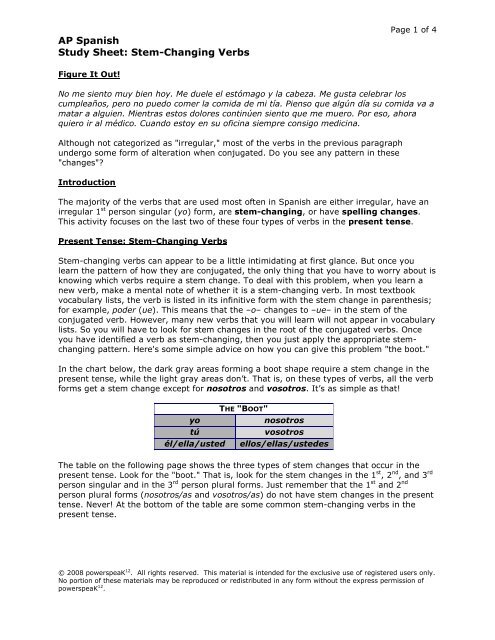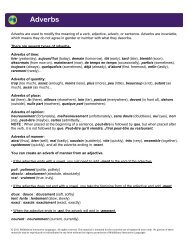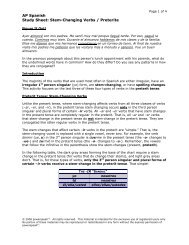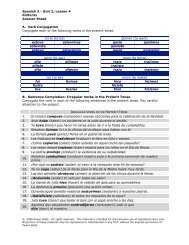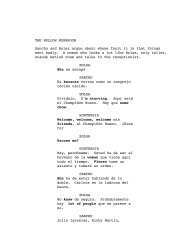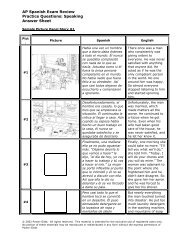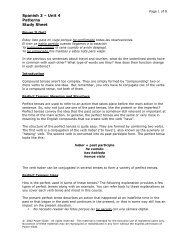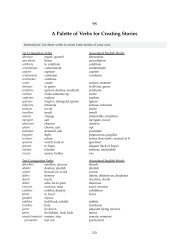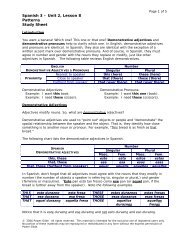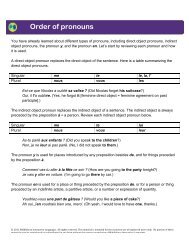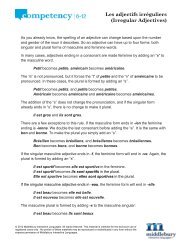AP Spanish Study Sheet: Stem-Changing Verbs
AP Spanish Study Sheet: Stem-Changing Verbs
AP Spanish Study Sheet: Stem-Changing Verbs
Create successful ePaper yourself
Turn your PDF publications into a flip-book with our unique Google optimized e-Paper software.
<strong>AP</strong> <strong>Spanish</strong><br />
<strong>Study</strong> <strong>Sheet</strong>: <strong>Stem</strong>-<strong>Changing</strong> <strong>Verbs</strong><br />
Figure It Out!<br />
Page 1 of 4<br />
No me siento muy bien hoy. Me duele el estómago y la cabeza. Me gusta celebrar los<br />
cumpleaños, pero no puedo comer la comida de mi tía. Pienso que algún día su comida va a<br />
matar a alguien. Mientras estos dolores continúen siento que me muero. Por eso, ahora<br />
quiero ir al médico. Cuando estoy en su oficina siempre consigo medicina.<br />
Although not categorized as "irregular," most of the verbs in the previous paragraph<br />
undergo some form of alteration when conjugated. Do you see any pattern in these<br />
"changes"?<br />
Introduction<br />
The majority of the verbs that are used most often in <strong>Spanish</strong> are either irregular, have an<br />
irregular 1 st person singular (yo) form, are stem-changing, or have spelling changes.<br />
This activity focuses on the last two of these four types of verbs in the present tense.<br />
Present Tense: <strong>Stem</strong>-<strong>Changing</strong> <strong>Verbs</strong><br />
<strong>Stem</strong>-changing verbs can appear to be a little intimidating at first glance. But once you<br />
learn the pattern of how they are conjugated, the only thing that you have to worry about is<br />
knowing which verbs require a stem change. To deal with this problem, when you learn a<br />
new verb, make a mental note of whether it is a stem-changing verb. In most textbook<br />
vocabulary lists, the verb is listed in its infinitive form with the stem change in parenthesis;<br />
for example, poder (ue). This means that the –o– changes to –ue– in the stem of the<br />
conjugated verb. However, many new verbs that you will learn will not appear in vocabulary<br />
lists. So you will have to look for stem changes in the root of the conjugated verbs. Once<br />
you have identified a verb as stem-changing, then you just apply the appropriate stemchanging<br />
pattern. Here's some simple advice on how you can give this problem "the boot."<br />
In the chart below, the dark gray areas forming a boot shape require a stem change in the<br />
present tense, while the light gray areas don’t. That is, on these types of verbs, all the verb<br />
forms get a stem change except for nosotros and vosotros. It’s as simple as that!<br />
THE "BOOT"<br />
yo nosotros<br />
tú vosotros<br />
él/ella/usted ellos/ellas/ustedes<br />
The table on the following page shows the three types of stem changes that occur in the<br />
present tense. Look for the "boot." That is, look for the stem changes in the 1 st , 2 nd , and 3 rd<br />
person singular and in the 3 rd person plural forms. Just remember that the 1 st and 2 nd<br />
person plural forms (nosotros/as and vosotros/as) do not have stem changes in the present<br />
tense. Never! At the bottom of the table are some common stem-changing verbs in the<br />
present tense.<br />
© 2008 powerspeaK 12 . All rights reserved. This material is intended for the exclusive use of registered users only.<br />
No portion of these materials may be reproduced or redistributed in any form without the express permission of<br />
powerspeaK 12 .
<strong>AP</strong> <strong>Spanish</strong><br />
<strong>Study</strong> <strong>Sheet</strong>: <strong>Stem</strong>-<strong>Changing</strong> <strong>Verbs</strong><br />
O UE E IE E I<br />
MOSTRAR (to show) PENSAR (to think)<br />
muestro mostramos pienso pensamos<br />
muestras mostráis piensas pensáis<br />
muestra muestran piensa piensan<br />
PODER (to be able) QUERER (to want)<br />
puedo podemos quiero queremos<br />
puedes podéis quieres queréis<br />
puede pueden quiere quieren<br />
Page 2 of 4<br />
DORMIR (to sleep) SENTIR (to feel) PEDIR (to ask for)<br />
duermo dormimos siento sentimos pido pedimos<br />
duermes dormís sientes sentís pides pedís<br />
duerme duermen siente sienten pide piden<br />
OTHER O UE VERBS OTHER E IE VERBS OTHER E I VERBS<br />
acostar<br />
almorzar<br />
aprobar<br />
contar<br />
costar<br />
encontrar<br />
mostrar<br />
probar<br />
recordar<br />
sonar<br />
volar<br />
devolver<br />
doler<br />
llover<br />
poder<br />
resolver<br />
volver<br />
dormir<br />
morir<br />
to wake up<br />
to eat lunch<br />
to pass<br />
to count<br />
to cost<br />
to encounter<br />
to show<br />
to try<br />
to remember<br />
to ring<br />
to fly<br />
to give back<br />
to hurt<br />
to rain<br />
to be able<br />
to resolve<br />
to return<br />
to sleep<br />
to die<br />
acertar<br />
cerrar<br />
comenzar<br />
confesar<br />
empezar<br />
negar<br />
nevar<br />
pensar<br />
recomendar<br />
sentar(se)<br />
atender<br />
defender<br />
encender<br />
entender<br />
perder<br />
querer<br />
advertir<br />
consentir<br />
convertir<br />
divertir<br />
hervir<br />
mentir<br />
preferir<br />
sentir<br />
sugerir<br />
to be right<br />
to close<br />
to begin/start<br />
to confess<br />
to begin/start<br />
to deny<br />
to snow<br />
to think<br />
to<br />
recommend.<br />
to sit<br />
to wait on<br />
to defend<br />
to light<br />
to intend<br />
to lose<br />
to want<br />
to advise<br />
to allow<br />
to convert<br />
to entertain<br />
to boil<br />
to lie<br />
to prefer<br />
to feel<br />
to suggest<br />
competir<br />
despedir<br />
gemir<br />
impedir<br />
medir<br />
pedir<br />
repetir<br />
servir<br />
vestir<br />
to compete<br />
to send away<br />
to groan<br />
to impede<br />
to measure<br />
to ask for<br />
to repeat<br />
to serve<br />
to dress<br />
The words in bold in the table above are those that were conjugated in the upper part of<br />
the table.<br />
© 2008 powerspeaK 12 . All rights reserved. This material is intended for the exclusive use of registered users only.<br />
No portion of these materials may be reproduced or redistributed in any form without the express permission of<br />
powerspeaK 12 .
<strong>AP</strong> <strong>Spanish</strong><br />
<strong>Study</strong> <strong>Sheet</strong>: <strong>Stem</strong>-<strong>Changing</strong> <strong>Verbs</strong><br />
Page 3 of 4<br />
The verbs adquirir, jugar, and oler are unique stem-changing verbs of their kind. The<br />
following table shows their conjugations with the stem-changes in the "boot."<br />
U UE I IE O HUE<br />
JUGAR (to play) ADQUIRIR (to acquire) OLER (to smell)<br />
juego jugamos adquiero adquirimos huelo olemos<br />
juegas jugáis adquieres adquirís hueles olís<br />
juega juegan adquiere adquieren huele huelen<br />
Now that you know the pattern of stem-changing verbs in the present tense, and you have<br />
identified some common stem-changing verbs, practice conjugating them until this becomes<br />
second nature. The exercises at the end of this Activity will help.<br />
Present Tense: Spelling Changes<br />
Sometimes when you conjugate a verb in the present tense, some forms undergo a special<br />
spelling change. Why?<br />
Unlike English, <strong>Spanish</strong> spelling is highly consistent in matching letters with sounds. That’s<br />
why some verbs require a spelling change to preserve the correct pronunciation of the stem.<br />
The following table highlights the spelling changes that occur in the 1 st person singular (yo)<br />
form of certain verbs. It also shows some common verbs with that particular spelling<br />
change.<br />
<strong>Verbs</strong> ending in –cer or –cir preceded by a vowel add z before c in the first person singular.<br />
conocer (to know) conozco, conoces, conoce, conocemos, conocéis, conocen<br />
conducir (to drive) conduzco, conduces, conduce, conducimos, conducís, conducen<br />
Other –cer and –cir<br />
verbs:<br />
aparecer<br />
crecer<br />
parecer<br />
to appear<br />
to grow<br />
to seem<br />
introducir<br />
producir<br />
traducir<br />
to introduce<br />
to produce<br />
to translate<br />
<strong>Verbs</strong> ending in –cer or –cir preceded by a consonant change c to z in the first person<br />
singular.<br />
vencer (to win) venzo, vences, vence, vencemos, vencéis, vencen<br />
esparcir (to scatter) esparzo, esparces, esparce, esparcimos, esparcís, esparcen<br />
Other –cer and –cir<br />
verbs:<br />
convencer to convince ejercer to exercise<br />
<strong>Verbs</strong> ending in –ger and –gir change g to j in the first person singular.<br />
proteger (to protect) protejo, proteges, protege, protegemos, protegéis, protegen<br />
dirigir (to direct) dirijo, diriges, dirige, dirigimos, dirigís, dirigen<br />
Other –ger and –gir<br />
verbs:<br />
corregir (i)<br />
coger<br />
to correct<br />
to grasp<br />
exigir<br />
recoger<br />
to demand<br />
to collect<br />
© 2008 powerspeaK 12 . All rights reserved. This material is intended for the exclusive use of registered users only.<br />
No portion of these materials may be reproduced or redistributed in any form without the express permission of<br />
powerspeaK 12 .
<strong>AP</strong> <strong>Spanish</strong><br />
<strong>Study</strong> <strong>Sheet</strong>: <strong>Stem</strong>-<strong>Changing</strong> <strong>Verbs</strong><br />
Page 4 of 4<br />
<strong>Verbs</strong> ending in –guir change gu to g in the first person singular.<br />
extinguir (to extinguish) extingo, extingues, extingue, extinguimos, extinguís, extinguen<br />
Other –guir verbs:<br />
conseguir (i)<br />
distinguir<br />
to obtain<br />
to distinguish<br />
proseguir (i)<br />
seguir (i)<br />
to pursue<br />
to follow<br />
The following table highlights "boot" spelling changes. That is, these spelling changes occur<br />
in the 1 st , 2 nd , and 3 rd person singular and in the 3 rd person plural forms only! It also shows<br />
some common verbs with that particular spelling change.<br />
<strong>Verbs</strong> ending in –uir change i to y before o and e.<br />
incluir (to include) incluyo, incluyes, incluye, incluimos, incluís, incluyen<br />
Other –uir verbs:<br />
concluir<br />
contribuir<br />
to conclude<br />
to contribute<br />
destruir<br />
influir<br />
to destroy<br />
to influence<br />
Some verbs ending in –iar and –uar change the i to í and the u to ú in all forms except<br />
nosotros and vosotros.<br />
confiar (to trust) confío, confías, confía, confiamos, confiáis, confían<br />
acentuar (to accentuate) acentúo, acentúas, acentúa, acentuamos, acentuáis, acentúan<br />
Other –iar and –uar<br />
verbs of this type:<br />
Regular –iar & –uar<br />
verbs:<br />
ampliar<br />
continuar<br />
enfriar<br />
anunciar<br />
apreciar<br />
averiguar<br />
to enlarge<br />
to continue<br />
to cool<br />
to announce<br />
to value<br />
to find out<br />
graduar(se)<br />
guiar<br />
situar<br />
cambiar<br />
estudiar<br />
limpiar<br />
to graduate<br />
to guide<br />
to place<br />
to change<br />
to study<br />
to clean<br />
Of course, the lists of example verbs in the tables are not exhaustive. That is, these are<br />
only examples. Many more verbs exist for each point explained above.<br />
© 2008 powerspeaK 12 . All rights reserved. This material is intended for the exclusive use of registered users only.<br />
No portion of these materials may be reproduced or redistributed in any form without the express permission of<br />
powerspeaK 12 .


